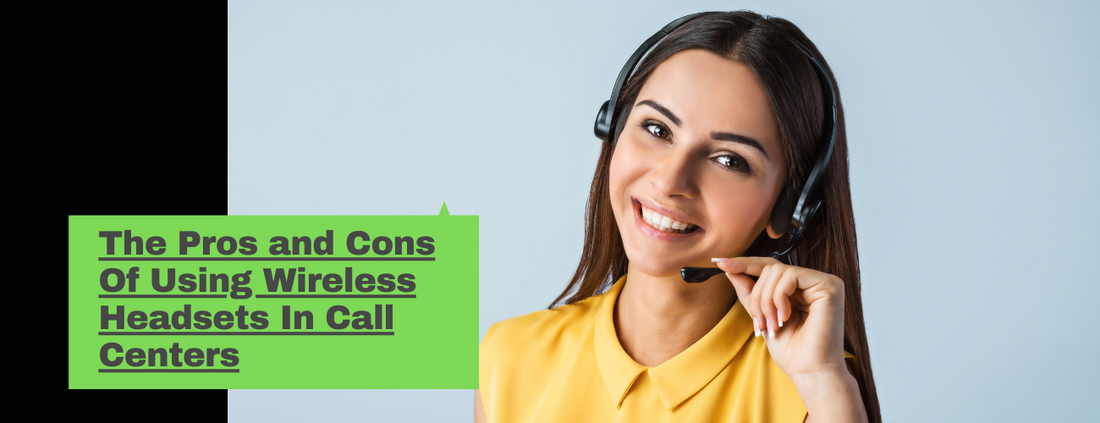Anyone who works in a Call Center knows the value of using a headset. Their benefits are wide-ranging, and include things like freeing up your hands to take notes, use a computer keyboard, and above all, keeps you from cradling a phone receiver on your shoulder which is a practice that's widely known to bring on health related injuries .
The most common type of headset used in Call Centers are those that have a cord.

And though these headsets enormously better than using the alternatives like telephone handsets or even speakerphones, there are other kinds of headsets that can provide greater convenience, and can help drive Agent productivity to greater heights. I’m referring to using wireless headsets in your Call Center.
If you're a Call Center Supervisor, or Manager you might be thinking wireless headsets aren’t for you. For most, the fear is the thought of Agents roaming around the office attempting to look busy rather than being at their desk assisting callers. The truth is,whether an Agent is using a wired or wireless headset, it's Management's responsibility to monitor their work productivity. So if an Agent who's wearing a wireless headset is spending too much time away from the desk, and isn't being as productive as they could be, Management needs to identify this, and take corrctive action. Just like they need to do if the same Agent is wearing a wired headset.
Let’s take a look at the reasons why using a wireless headset in a Call Center might not be for you, and then we'll explore some of the reasons why it could.
7 Reasons not to use wireless headsets in a Call Center

The first, and most common reason that a Call Center Manager might get nervous just thinking about using wireless headsets in the Call Center is:
- Agents not being at their desk. The action takes place at the desk, and when Agents are at their desk, productivity, and customer service can suffer. Most Call Center Managers like seeing Agents at the desk working. Although, just because an Agent is at the desk, are they always working and being their most productive self? It's hard to know for sure unless you're using software that provides a view into worker activities and productivity.
- Connectivity issues. Wireless headsets rely on having a good, stable and reliable connection between the headset and a base unit, USB Adapter, or from the headset directly to a Bluetooth enabled computer. If anything goes wrong with that connection, there’s the risk of poor audio quality, or even a dropped call which can result in lost sales opportunities, have your customers unhappy, and worker frustration.
- Interference. Interference with wireless devices can come from different sources such as microwave ovens, wireless networks, wireless devices and more. Interference can also come from other headsets, especially if they are densely populated. The good news is wireless headsets today benefit from decades of history and experience on this, and the state of wireless connectivity is vastly superior to what it was just a few short years ago.
- Call Security Concerns. This is a concern for many people, because the safety and confidentiality of conversations is very important, especially if you operate in a data sensitive environment like banking, investments or Healthcare for example. Nobody wants eavesdropping or their calls hacked. Technology improves over time thanks to advances in research and development. Wireless headsets benefit from modern encryption that in cases, were originally for use in encrypting military communications. Though hacking and eavesdropping remains a possibility, its likelihood is far less than it was in earlier generations of wireless headsets.
-
Battery Anxiety. When using a wireless headset, you have a battery that needs to be charged, and then recharged. The concerns with wireless headset batteries are twofold; 1. Will the wireless headset battery provide enough power to get the Agent through the day? And if not, what do you do?
2. What do you do if the Agent didn’t charge the battery overnight, and when the Agent comes to work the next day and is faced with a dead battery? Now what? These are legitimate concerns, but easily overcome. Here’s what I mean by that. First, if the wireless headset battery isn’t stout enough to power you through your day, simply place it on the charger whenever taking a break, or going to lunch. That solves the problem in most cases.
And if the battery is dead when the Agent arrives to work in the morning, there’s a solution for that as well. Many wireless headsets today can now be used when they’re plugged in for a recharge. Not all wireless headsets have this ability, but many currently do. This is a feature that's becoming more common on new headsets. So if you like wireless headsets, but this is concerning to you, make sure to verify that the model you’re considering has this capability.
- Adoption and Training. Call Center Managers may find challenges in getting everyone fully trained, and proficient at using a wireless headset as some people might struggle to understand new technology. This can be due to resistance to change, or someone who’s simply not savvy enough to grasp the nuances of wireless headsets. Either way, it poses a challenge, but the good news is vendors can be helpful by providing video tutorials, phone or email support, or even one-on-one training as needed. So as a Call Center Manager, you don’t have to feel like you must go it alone when it comes to training and orientation. Some skilled vendor support can go a long way towards speeding up the wireless headset adoption process, and help to make the Manager’s job easier. If your vendor doesn't offer support, it might be time to find a more helpful vendor.
- Cost. And then of course there’s the elephant in the room, cost. Many times this is the reason most Managers shy away from considering wireless headsets. Because when you compare the upfront cost of a wireless headset to that of a wired model, you’ll see a fairly wide price difference. And if you’re operating with a tight budget, that can be the difference between selecting a headset with a cord and one without. But there’s also the idea of short term, and long term costs that also needs to be considered. Because wired headsets have a cable, those cables are known to be susceptible to damage from a desk drawer, being run over by an office chair, or getting snagged on the arm of a chair, and being pulled. Even time, and contact with our skin, which contains oils, can break down the cable lining, and causes it to become brittle and fracture. These things can lead to the need for headset replacements, which in turn increases the headset's overall cost beyond what you paid for it initially. So, long term costs need to be taken into consideration.
Now that we’ve taken a look at the reasons why a Call Center Manager might not be interested in wireless headsets, let’s give equal time and attention to the reasons that the same Manager might actually love them.
5 reasons you should consider wireless headsets in your Call Center

- Mobility. This is perhaps the most valuable aspect of using a wireless headset. You have the ability to move around your workspace while still being on a call. You also have the ability to step away from the desk and get an audible alert of an incoming call, which you can answer even remotely. This frees you up to go to the printer to retrieve a document, or grab that much needed cup of coffee. And because you can answer calls away from the desk, you won’t miss calls, or have to listen to voice messages and return those calls. This helps to make Agents more productive, while at the same time, gives your callers better service.
- Connectivity. Unlike wired headsets, wireless models have the capability to connect to multiple devices. For example, a wireless headset can connect to a desk phone, to a desk phone and computer, or to a desk phone, computer and mobile device. Depending on what you need today, and tomorrow, there’s bound to be a wireless headset that’s right for your situation. And by the way, I mentioned tomorrow’s needs because they’re oftentimes overlooked, and shouldn’t be. The last thing you want is to buy new headsets today that aren’t compatible with your connection needs in the near future. The connection options that wireless headsets offer is vastly superior to the limitations of most wired models.
-
Health & Safety - No wires means less entanglements, literally. Headset cords can be problematic because they tend to get snagged on things, like the arm of the desk chair, which can cause the headset to be abruptly jerked off your head if you stand up suddenly. I know because it's happened to me many times.Wireless headsets eliminate that issue, and are therefore a safer choice. No cords to trip on, no cords to get tangled on the arm of your desk chair, and no cord to get slammed in your desk drawer. A wireless headset gives you a simpler, cleaner and tangle free headset wearing experience.
- Enhanced productivity. There’s little arguing that having the ability to be mobile, and multi-task is an advantage. A wired headset has you anchored to your desk and not able to do other non-desk related tasks like grabbing a copy off the printer, or a document off the fax (yes, these are still in use today), or even dare I say, making a quick trip to the bathroom. You can do these things if you use a wired headset, but any calls you receive will be missed, and either result in a lost opportunity, or will end up in your voicemail. And when it does, you’ll be spending more time listening to those messages, and then returning calls. That’s a productivity drain, and one that a wireless headset fully resolves. Simply put, you can get more done if you use a wireless headset.
- Long term savings. As I alluded to above, the total cost of ownership goes well beyond the initial price of the headset. Yes, that’s important for the here and now, but what about the headset life cost? That is, the total cost for things such as repairing fractured cords, if you can even find someone to do it? How about the expense of replacing the headset because it can’t be repaired? Wired headsets commonly experience issues relating to the cord. They break for a host of reasons, but that isn't the only thiing that can go wrong with them. Headbands break with most not being replaceable. Microphones can go out which can leave you speechless, quite literally. Or, you might find that the ear speaker(s) malfunction. Whatever the causes are that has you seeking a replacement, suffice it to say that a wired headset costs more than what the initial price is. And with the added efficiencies, and productivity gains you'll get by usiing a wireless headset, it more than pays for itself over time.
Final thoughts

It’s important to note that not all Call Centers operate the same, and whether a Manager chooses to use wired or wireless headsets comes down to the specific needs of the Center, and personal preference.
Some Call Center Managers might feel that the benefits of a wireless headset outweigh the up front price, and any of the perceived drawbacks. Others might feel that wireless headsets could give Agents a reason to not be at their desk which can be viewed as Agents being less productive. Still others might harbor the thought that wired headsets come with longer warranties, which means problems can be resolved without expense through a warranty exchange.
The problem with that line of thought is the vast majority of companies don’t know if their headsets are in warranty or not. The most common practice is to either throw them out, recycle them, or put them in a box that will probably end up in a storeroom. In years past, wired headsets DID have longer warranties than wireless models, but that too has changed. Today, it’s not uncommon for wireless headsets to have the same, or even longer warranties than their wired counterparts.
There's also a popular line of thinking that wired headsets provide superior sound when compared to wireless models. In years past that was unquestionably true, but as with most things, nothing remains the same. Companies who manufacture headsets have upped their game because wireless headsets today sound every bit as good as wired models. There are exceptions to this, but in general, wireless headsets these days sound really good.
And finally, some Call Centers might consider a hybrid approach. That is, a mix of both. Agents using wired headsets, and Supervisors using wireless isn't unheard of. Taking this approach satisfies those who have concern about Agents roaming the office, but at the same time, makes their Supervisor more accessible by phone, even when they're away from their desk. And when the Supervisor is more reachable, they can provide better service to the Agents, and customers.
Whichever headset type you choose, both are going to have their pros and cons, so it really comes down to your needs, your budget, and your thoughts on which is best suited for your unique needs and situation. One thing is for sure, and that's the debate over using wireless headsets in Call Centers is bound to continue.
Have Questions, or need some help?

Selecting the best headset can be confusing. In order to help remove some of that confusion, Discover headsets offers free advice on headsets that best meet your needs. You don’t have to feel like you’re alone on an island because help is as close as your phone, or computer.
Contact us today, and one of our helpful Advisors will be happy to help. Go here to see the different ways we can be reached.



